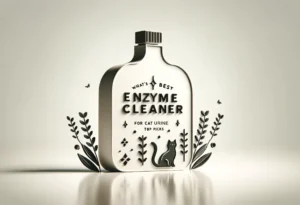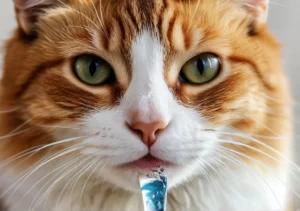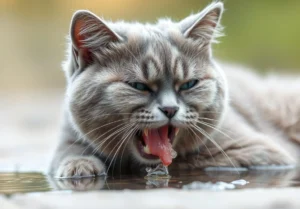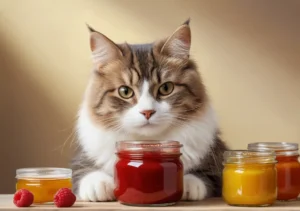Cats are known for their love of milk, but did you know that they actually should not be drinking it? The truth is, most cats are lactose intolerant, and consuming milk can lead to digestive issues and discomfort for our feline friends.
What is lactose intolerance in cats?
Let’s talk about lactose intolerance in cats. Just like some people, most adult cats have a difficult time digesting lactose, which is the sugar found in milk. This happens because cats’ bodies produce less lactase, the enzyme needed to break down lactose, as they grow older. When cats consume milk, the undigested lactose can lead to digestive issues like diarrhea, vomiting, and stomach pain.
One interesting thing to note is that fermented dairy products like cheese and yogurt contain less lactose and may be more tolerable for some cats. However, it’s still best to stick to cat-specific milk replacers or water to keep your furry friend’s tummy happy and healthy.
Why do kittens drink milk?
Ah, adorable little kittens and their love for milk! Kittens rely on their mother’s milk for essential nutrients and hydration in their early days of life. Mother cats produce milk that is high in fat and protein, providing everything a growing kitten needs to thrive.
As kittens grow, they start to wean off milk and transition to solid food. This is because their bodies gradually decrease lactase production, making it harder for them to digest milk without any unpleasant side effects. So, while kittens may rely on milk for a good start in life, adult cats are better off avoiding it to steer clear of any tummy troubles.
Here’s a quick tip: If you’re caring for a kitten without a mother, make sure to use kitten milk replacers specifically designed to meet their nutritional needs. This ensures they get all the essential nutrients without the risk of digestive upset from regular cow’s milk.
What happens when cats drink milk?
Contrary to popular belief , milk is not the purrfect treat for our feline friends. Cats, unlike kittens, are usually lactose intolerant, which means their bodies struggle to digest lactose, a sugar found in milk. When cats drink milk, it can lead to unpleasant side effects like vomiting and diarrhea. This happens because the lactose passes through their system without being properly broken down, causing digestive upset.
If your cat has a sip of milk and experiences these symptoms, it’s best to avoid offering dairy products in the future. Opt for cat-friendly treats instead to keep their stomach happy and healthy.
Can some cats drink milk?
While the majority of adult cats struggle with digesting milk, there are exceptions. Some cats may have a genetic mutation that allows them to produce the enzyme lactase, which is needed to break down lactose. These lactase persistent cats can tolerate milk better than their lactose intolerant counterparts.
If you suspect your cat falls into this rare category, monitor their reaction closely when they have a small amount of milk. Look out for any signs of digestive issues like vomiting or diarrhea. However, even lactase persistent cats should only have milk in moderation as it can still lead to health problems if consumed in excess.
Cats that can handle milk better:
- Kittens: Young kittens naturally produce the enzyme lactase, allowing them to digest their mother’s milk.
- Some Mutations: Certain rare genetic mutations can enable adult cats to tolerate lactose to some degree.
- Water Substitute: If you want to give your cat a special treat, opt for lactose-free milk or cat-safe alternatives like water or specialty cat milk.
Remember, every cat is unique, so it’s essential to pay attention to how your furry friend reacts to different foods and treats to ensure their well-being.
What are some alternatives to milk for cats?
When it comes to finding suitable alternatives to cow’s milk for cats, it’s essential to consider options that are safe and nutritious. One popular choice is lactose-free cat milk, specially formulated to be easier on a cat’s digestive system. Another option is bone broth, which is not only hydrating but also provides essential nutrients. Water is also a great alternative to milk and should be readily available to your feline friend at all times.
In addition, wet cat food can also be a good substitute for milk, as it provides both hydration and essential nutrients. Remember that cats are obligate carnivores, so their diet should primarily consist of meat-based foods. By offering a variety of alternatives, you can ensure that your pet stays hydrated and healthy without the risk of digestive issues from consuming cow’s milk.
Is there any benefit to cats drinking milk?
While many people may associate cats with lapping up milk in cartoons and movies, the reality is that most cats are lactose intolerant and should not consume cow’s milk. Despite this, there are some potential benefits to giving cats milk alternatives.
One benefit of offering lactose-free cat milk is that it can provide additional hydration, which is essential for a cat’s overall health. In some cases, a small amount of cat milk can be a tasty treat that helps entice picky eaters to consume more liquid. However, it’s crucial to remember that water is the best source of hydration for cats, and any milk alternatives should only be given in moderation.
Ultimately, while there are some potential benefits to cats drinking milk alternatives, it’s important to ensure that any options offered are safe and do not cause digestive upset. Always consult with your veterinarian before introducing new foods or beverages into your cat’s diet to ensure they are appropriate for your furry friend.
Fun facts about cats and milk
Cats and milk, a classic combination, right? Wrong! Despite popular belief, cats are actually lactose intolerant. Kittens can digest their mother’s milk due to special enzymes, but most adult cats cannot properly process lactose. Giving your feline friend milk can lead to upset stomachs, diarrhea, or even more serious health issues.
Did you know that not all cats are lactose intolerant? Some cats may be able to tolerate small amounts of milk without any adverse effects. However, it’s best to err on the side of caution and avoid giving your cat milk altogether.
The best ways to treat your cat
When it comes to your cat’s dietary needs, it’s essential to provide them with a balanced and nutritious diet. While cats may enjoy the taste of milk, it’s best to avoid giving it to them. Instead, opt for specially formulated cat milk, which is lactose-free and designed to meet your cat’s nutritional requirements.
Ensure that your cat has access to fresh water at all times to keep them hydrated. Additionally, consider feeding your cat high-quality cat food that is rich in protein and essential nutrients. Treats should be given sparingly to avoid weight gain and maintain your cat’s overall health.
Remember, a happy and healthy cat is a well-fed cat . Focus on providing them with the proper nutrition they need to thrive and avoid the temptation to give them milk as a treat.
- Provide your cat with lactose-free milk alternatives
- Offer a balanced and nutritious diet
- Keep fresh water available at all times
And there you have it, keep your cat content and healthy by ensuring their dietary needs are met without the need for milk.
Alex, a passionate animal lover, has experience in training and understanding animal behavior. As a proud pet parent to two dogs and three cats, he founded AnimalReport.net to share insights from animal experts and expand his knowledge of the animal kingdom.




